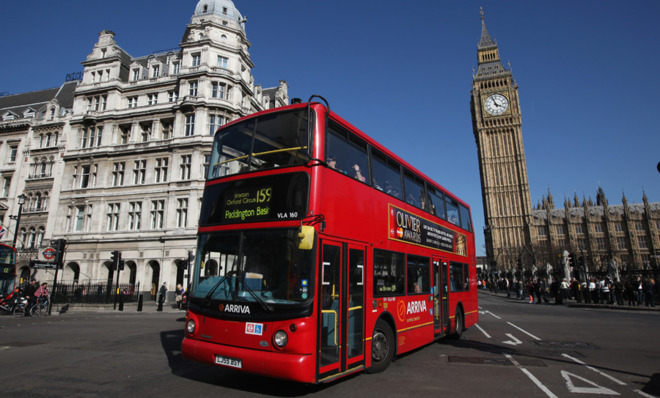Here's another good sign that sanctions against Russia are working
A Russian oligarch just paid $236 million for an apartment with no toilet

A free daily email with the biggest news stories of the day – and the best features from TheWeek.com
You are now subscribed
Your newsletter sign-up was successful

When is $236.4 million a good deal for an unfinished apartment that still needs a few million dollars of work?
When you need to get your money out of a former Soviet country, fast.
A man believed to be from Russia or Ukraine has just paid that amount for a 16,000-square foot London apartment, making it the most expensive property ever sold in Britain.
The Week
Escape your echo chamber. Get the facts behind the news, plus analysis from multiple perspectives.

Sign up for The Week's Free Newsletters
From our morning news briefing to a weekly Good News Newsletter, get the best of The Week delivered directly to your inbox.
From our morning news briefing to a weekly Good News Newsletter, get the best of The Week delivered directly to your inbox.
Located in the exclusive One Hyde Park building in tony Knightsbridge, the apartment has no flooring, no bathrooms, and no interior walls.
But if its new owner is like many wealthy Russians and Ukrainians snapping up London property in the last two months, he's probably more interested in parking some cash than putting up curtains.
Although London has long served as a playground for oligarchs from Russia and Eastern Europe, unrest in Ukraine and fear of sanctions and other financial controls against Moscow have sped up the transfer of cash into safe British assets.
Capital flight from Russia alone, which a former central banker estimated at $50 billion in 2012, is expected to possibly quadruple this year.
A free daily email with the biggest news stories of the day – and the best features from TheWeek.com
To get a sense of just how fast the money is flowing out of the region, the cost of that single Knightsbridge flat isn't far behind the $304 million that Russian buyers spent in London in all of 2013, according to estimates from the real estate company Savills reported in the Financial Times.
Property consultant Charles McDowell says he's been deluged with calls from Russian and Ukrainian buyers seeking $33 million mansions and $8 million bolt-holes from central Belgravia to suburban Highgate in north London since serious unrest in Ukraine began two months ago.
They're looking for the biggest price tag, McDowell says, not the best deal.
"To them it's more a question of getting money out of their part of the world and putting it somewhere safe," he says. "The price they pay is really not the most important factor."
McDowell can track the world's latest conflicts by the nationality of clients calling his Chelsea office. He saw similar interest from the Middle East after the Arab Spring.
"Where does money gravitate when things get pretty tough?" he says. "The answer is that London always seems to come out on top."
The lure of investments from Russia and Ukraine continues to vex the British response to Russia's annexation of Crimea and subsequent apparent efforts to destabilize eastern Ukraine.
That's not only a British problem.
German Chancellor Angela Merkel was said to be deeply annoyed that her top foreign policy advisor attended former Chancellor Gerhard Schroeder's lavish St. Petersburg birthday bash with Russian President Vladimir Putin this week just as the EU was finalizing its much-delayed list of sanctioned individuals.
But in the UK, where Eastern Europe's wealthiest spend their money on property, school fees, football teams, and lawyers, the question of how to handle Russia has raised some uncomfortable questions about Britain's fealty to foreign cash.
"It's OK to be a servant to the oligarchy class but not a serf," said Roger Boyes, diplomatic editor of the Times newspaper, criticizing Britain's role as "concierge of the oligarchs."
"Servants can choose their masters," he added. "Serfs can't."
Boyes was speaking during a debate Thursday at London's Frontline Club for journalists about Britain's response to Putin.
Other participants took a realpolitik view of British interests.
"We should do business with Putin, and do business with the oligarchs in general," said Tony Brenton, the British ambassador to Russia from 2004 to 2008. "This is not a City of London issue. It's a global issue of how we manage globalization."
Russia is "too big, too rich, too centered in the world" to ignore, Brenton added. If those advocating a hard line against Putin were to be "morally consistent," he said, they should also oppose business dealings with China, Saudi Arabia and Nigeria — all countries with appalling human rights records and enormous investments in British interests.
"We need to remember that we depend upon these countries to give us employment and prosperity," he said.
"It's a big, bad dirty world out there," Brenton said in a moment of candor, "and to some extent you need to be willing to get your hands dirty if you want to make a living in it."
This article, by Corinne Purtill, originally appeared at GlobalPost.
More from GlobalPost...
-
 5 calamitous cartoons about the Washington Post layoffs
5 calamitous cartoons about the Washington Post layoffsCartoons Artists take on a new chapter in journalism, democracy in darkness, and more
-
 Political cartoons for February 14
Political cartoons for February 14Cartoons Saturday's political cartoons include a Valentine's grift, Hillary on the hook, and more
-
 Tourangelle-style pork with prunes recipe
Tourangelle-style pork with prunes recipeThe Week Recommends This traditional, rustic dish is a French classic